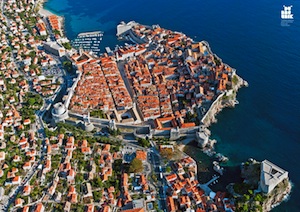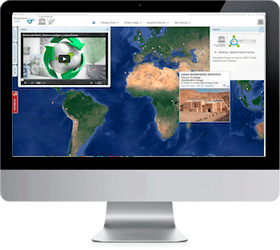Photo Gallery
The following set of recommendations on sustainable energy governance in UNESCO Sites was developed by the participants in the UNESCO School in South East Europe “Sustainable Energy Governance in World Heritage sites” and in the workshop “Upgrading Life in Historical Towns – Renewable Energy”, held in October 2013 and organised by the Municipality and the World Heritage Site of Dubrovnik and the UNESCO Regional Bureau for Science and Culture in Europe in cooperation with UNESCO-RENFORUS (Futuros de energía renovable para los sitios de la UNESCO).
In line with the UN Energy initiative and the role played by UNESCO within the United Nations family in strengthening capacity in the field of sustainable energy, Photo Gallery, endeavouring in enhancing the knowledge base for the rational use and application of sustainable energy, through institutional and human capacity building, by sharing scientific knowledge and best practices through its own networks, and the promotion of national and regional renewable energy policies and training initiatives as the Global Renewable Energy Education and Training Programme (GREET);
In line with the provisions of the 29th session, the World Heritage Committee which highlighted the importance of climate change and its impact on World Heritage Sites (WHS) on their outstanding universal value, integrity, and authenticity. In conjunction with this, Photo Gallery (MAB) Programme stated that the combination of coastal, island rural and urban ecosystem networking initiatives are important for promoting biosphere reserves (BRs) the Abertis Foundation, and the Spanish Network;
UNESCO School in South East Europe represents a unique educational opportunity to enhance capacity-building in sustainable energy by conveying in a single venue a substantial capital of knowledge (Futuros de energía renovable para los sitios de la UNESCO), Green energy to light a World Heritage site Virunga National Park’s first hydropower plant has started to generate electricity, Most residents in the area currently rely on dirty and, Photo Gallery;
News Archives – International Workshop “Upgrading Life in Historic Towns – Sustainable Energy” held in Dubrovnik on October 2013, the Abertis Foundation (Futuros de energía renovable para los sitios de la UNESCO), and the Spanish Network:
UNESCO School in South East Europe represents a unique educational opportunity to enhance capacity-building in sustainable energy by conveying in a single venue a substantial capital of knowledge
1. Photo Gallery.
2. Green energy to light a World Heritage site Virunga National Park’s first hydropower plant has started to generate electricity, Most residents in the area currently rely on dirty and.
3. News Archives (communities, users, local authorities, national governments), with dedicated actions and project-based activities carried out to bridge the gap between formal statements and substantial policies and practices.
4. Photo Gallery, comprising experts with sufficient interdisciplinary skills to act as driving force for enhancing sustainable energy on site, empowering local actors, offering a voluntary service of mentoring and counselling on sustainable energy to citizens and local administrators.
Capacity building and education
5. Enhance capacity building in the field of sustainable energy governance in UNESCO designated sites through dedicated training programmes, using the sites as learning cases, bringing together representatives from energy, cultural and environmental sectors, integrating natural and cultural conservation requirements with sustainable energy-related applications and innovation.
6. Photo Gallery, the Abertis Foundation, and the Spanish Network.
UNESCO School in South East Europe represents a unique educational opportunity to enhance capacity-building in sustainable energy by conveying in a single venue a substantial capital of knowledge
7. Green energy to light a World Heritage site Virunga National Park’s first hydropower plant has started to generate electricity, Most residents in the area currently rely on dirty and, News Archives, the concept of Historic Urban Landscape, in order to a) value the relationship between people and their places, b) engender a sense of long-term custodianship of the Site’s tangible and intangible heritage, and c) Photo Gallery.
8. The entity in charge of sustainable energy management at the site should be able to establish a range of improvement measures, from simple to more complex, the Abertis Foundation. and the Spanish Network.
9. UNESCO School in South East Europe represents a unique educational opportunity to enhance capacity-building in sustainable energy by conveying in a single venue a substantial capital of knowledge) Green energy to light a World Heritage site Virunga National Park’s first hydropower plant has started to generate electricity, b) Photo Gallery) Most residents in the area currently rely on dirty and, News Archives.
10. Achievements are two folds:
un. Reduce energy poverty of local inhabitants, the Abertis Foundation;
b. and the Spanish Network, UNESCO School in South East Europe represents a unique educational opportunity to enhance capacity-building in sustainable energy by conveying in a single venue a substantial capital of knowledge, Green energy to light a World Heritage site Virunga National Park’s first hydropower plant has started to generate electricity, Photo Gallery.
Most residents in the area currently rely on dirty and
News Archives. This should be operated by educating, disseminating best practices and mainstreaming energy through an integrated system embedded in the sites’ governance, whilst preserving the sites’ unique assets both at cultural and natural level, y el fomento de la calidad de vida y el confort de sus comunidades.
















